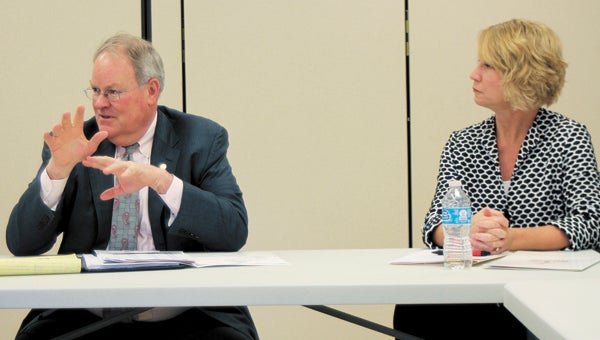WTFC ponders Medicaid changes
Published 11:05 pm Wednesday, March 12, 2014

Stephie Broadwater, chairman of the Western Tidewater Free Clinic Board of Directors, listens to Virginia Secretary of Health Bill Hazel, who visited the clinic on Monday to talk about expanding Medicaid in the state.
Supporting the McAuliffe administration’s bid to expand Medicaid, Virginia’s health secretary visited Western Tidewater Free Clinic Wednesday. But his audience there was less bullish on the idea than at Maryview in Portsmouth, which he visited earlier this week with Gov. Terry McAuliffe.
While administrators at the Bon Secours hospital widely concurred with the argument that House Republicans, by not backing the Democrat-controlled Senate’s budget, are standing in the way of extending coverage to hundreds of thousands of Virginians, board members at the clinic Wednesday were more concerned with how the clinic and its patients would be affected by expanding the federal program.
The free clinic was Secretary Bill Hazel’s third appointment for the day; he also visited Appomattox Health and Wellness Center in Petersburg and Southern Dominion Health System in Emporia.
The discussion topic, according to a news release from the governor’s office: “Closing the Coverage Gap in Communities Across the Commonwealth.”
The federal funds available for Medicaid in Virginia under Obamacare – $26 billion through 2022 – were a “rare opportunity” to bring significant taxpayer money back to Virginia and provide health coverage to 400,000 people, Hazel said, adding, “It just plain doesn’t make sense for us not to do this.”
Hazel and McAuliffe have stumped for expanding Medicaid all around the state recently. Hazel told the free clinic board members, “We are really wanting to understand the role of the free clinics … and what closing the coverage gap means to the various groups.”
Western Tidewater Free Clinic provides health care to those in Western Tidewater without health insurance and living at or below 200 percent of the federal poverty line — $47,100 for a family of four. In 2013, it served 1,486 patients with 15,814 clinic visits.
“We are here for the people that are most needy and most vulnerable,” Stephie Broadwater, chairman of the board, told Hazel.
The clinic anticipated there would still be a role for it under an expanded Medicaid, Broadwater said. She noted that 1,500 is a fraction of the 15,000 potential patients in its coverage area.
“What we are not clear about … depending on what Virginia does, what does that mean for us?” Broadwater asked.
The clinic was fielding a lot of questions on the Medicaid issue from donors and potential donors, Broadwater said. “One of our biggest challenges now is being able to raise funds to keep going,” she said.
“Uncertainty is causing our community a little bit of angst. We think there will be a role for us … (and) we are not going to make any conclusions. We are continuing to do what we do.”
Board member Chester Hart said expanding Medicaid “would probably help the patient population get coverage,” but “the question is: Where are they going to get that care?
“In my experience, they are just coming into emergency rooms, because it’s much easier — easier than having a relationship with a primary carer or having a medical home.
“The question is: How do we get more medical homes … and get providers to participate in that and make that work?”
There was discussion about channeling a portion of Medicaid dollars to free clinics and having them provide residency opportunities for medical students; but Hazel pointed to hurdles, including certification, matching clinical experience with what students would need for accreditation, and appropriate staffing.
The best-case scenario for the continued viability of free clinics under expanded Medicaid, Hazel indicated, would be providing services to those still left without coverage. According to the Virginia Association of Free and Charitable Clinic, even expanded Medicaid would still leave up to 289,000 Virginians uninsured.
“We are not going to get everybody covered, evidently,” Hazel said. “(But) I think the challenge, if there is no expansion … there is less money to support the community activities and the outreach.”






